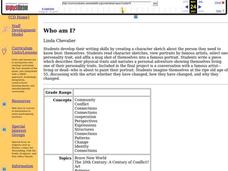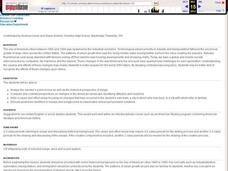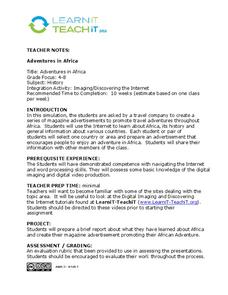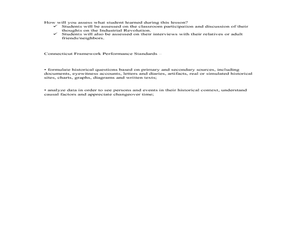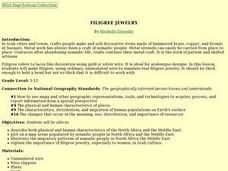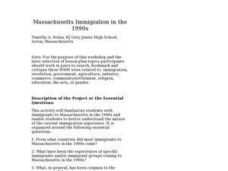Curated OER
Technology and the Great Depression
Students examine how technology affected the Great Depression era. They view a video, conduct Internet research, and write articles for a class technology magazine.
Curated OER
Where's My Dot?
Students explore the five basic elements of Monart, dot, curved line, straightline, and angle line to create a book about their home address. The concept of "big" is explored in this lesson.
Curated OER
"My Hero"
Pupils investigate heroism through the ages. They complete an online Webquest, explore various websites, compare/contrast different types of heroes, answer discussion questions, and locate newspaper articles about someone they consider...
Curated OER
Who am I?
Students practice their writing skills by creating a character sketch of themselves. After viewing portraits, they select one personality trait and put their own picture into the painting of their choice. They include a conversation with...
Curated OER
Eleanor Roosevelt and the Universal Declaration of Human Rights
Students explore the leadership of Eleanor Roosevelt through the use of historical documents. They examine the complexity of the creation of international documents. Students explore the Human Rights Declaration.
Curated OER
People of the Plains: Roles of Men And Women
Fourth graders study the geography of North America and the indigenous people who lived there. They read about rules, games, toys and dolls, and education. They fill out Venn Diagrams comparing the roles of men and women during the videos.
Curated OER
A Modern Pandora's Box
Learners research the myth of Pandora's Box. For this mythology lesson, students examine myths and are introduced to the story of Pandora's Box. Learners create a modern-day version of Pandora's Box.
Curated OER
You Don’t Know What You’ve Got Until It’s Gone: The Changing American Landscape
Young scholars examine the changing American landscape. In this cause and effect lesson, students listen to rock music that exemplifies urban growth in America and the interconnectedness of America today. Young scholars write cause and...
Curated OER
Adventures in Africa
Students research Africa and prepare an advertisement about travelling to the continent. In this African travel lesson, students research a country in Africa and write an advertisement that encourages travel to the country. Students...
Curated OER
Adventures in Africa
Students create travel magazine advertisements about Africa. In this Africa lesson plan, students research different facts about different countries in Africa and make advertisements to go there.
Curated OER
Early America
Students explore what a leader represents. In this social science instructional activity, students discuss what the traits, qualities, or characteristics are of a leader. Students also understand that leaders existed in America's past...
Curated OER
Early American Leaders
Students discover what the qualities or characteristics of a leader are by describing the traits of the principal of the school, followed by the leader of the town, state and country. In this leadership lesson plan, students will take...
Curated OER
Initiation – Industrial Revolution
Sixth graders examine historical artifacts. In this Industrial Revolution lesson, 6th graders discover how modern conveniences are connected to innovations of the Industrial Revolution era. Students interview adults about technological...
Curated OER
Filigree Jewelry
Young scholars describe physical and human characteristics of North Africa and the Middle East, plot on a map areas populated by nomadic people in those areas, explain importance of filigree jewelry in Arab culture, and create their own...
Curated OER
Designing a Quilt Pattern
Students create and color a one-patch quilt design based upon a regular hexagon. They examine quilts and photos of quilt designs, read a handout, and complete their quilt design on a worksheet.
Curated OER
Treasure Chest for Change
Students fill treasure chests. In this Holocaust instructional activity, students participate in an activity that requires them to find the value in everyday items.
Curated OER
The Three Gorges Dam- Should it be Completed?
Students research and analyze the geographic problem of whether or not the Three Gorges Dam should be completed. Students take a position on the issue, gather information related to their position, present their conclusions, and write a...
Curated OER
Tour of Our Century
Students will research the politics, arts, social climate, technological and
scientific advances of the 1900s. They will work in cooperative groups to
identify the most significant advances of one decade then use a computer to create a...
Curated OER
Problem in Inarqi
Students practice identifying and solving problems. They assume a role to solve an authentic problem. During the simulation, students explain the structure of the government and reasons for adopting that particular structure. They...
Curated OER
The Inside Story
Students think about and investigate some of the social problems facing their communities: what causes them; how extensive they are; and what can be done to solve them.
Curated OER
Introduction to a Unit on the 1930's Depression in America
Students view and discuss photographic images of the Dust Bowl by Dorothea Lange. They discuss who Dorothea Lange was and why she took the pictures, the conservational factors that contributed to the Dust Bowl and migrant workers and the...
Curated OER
Who We Are: To Know the Characteristics of a Population Within Certain Domains
Students, through research, discover the characteristics of the population of Quebec and compare them to those of Canada as a whole. They create a class presentation about information they found.
Curated OER
Social Studies: Analyzing Massachusetts Immigration
Students investigate immigration in Massachusetts during the 1990's. They research a series of questions pertaining to immigration, including their experiences, obstacles, and countries of origin. They graph the five most prevalent...
Curated OER
The Arms Race - From the Beginning to the End
Ninth graders focus on the political and technological developments of the Cold War. They, in groups, read and summarize the speech they are given. They should provide a short presentation based on their interpretation.



